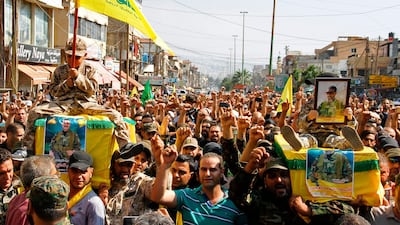As buses begin the transfer of as many as 10,000 Syrians from Lebanon back to Syria, Hizbollah appears to be enjoying its greatest level of influence in years.
The returns are part of a deal that follows a Hizbollah operation to remove hundreds of fighters belonging to Hayat Tahrir Al Sham, a militant alliance dominated by Syria's former Al Qaeda affiliate, now known as Jabhat Fatah Al Sham.
The operation was the culmination of Hizbollah efforts to secure the Lebanese-Syrian border that began in earnest in 2014. This was an important step in bolstering the Syrian regime of Bashar Al Assad.
The group has already undertaken large-scale offensives against militants and in support of Mr Al Assad in Syria, but last week's operation was the largest offensive it has ever undertaken in Lebanon.
By fighting militants inside Lebanon and helping negotiate the return of refugees to Syria, the group is addressing two of the most pressing concerns for many Lebanese.
“Hizbollah has been facilitating refugee flows back across the border, and it is hard for anyone to be critical of this,” said Amal Ghorayeb, a professor of political science at the Lebanese American University.
Since 2014, attacks by militants outside the border region have been rare, an achievement that most Lebanese credit to Hizbollah’s co-ordination with the Lebanese army and intelligence.
Hizbollah received criticism even from within its own ranks when it became heavily involved in Syria’s civil war in 2012, to support Mr Al Assad. Since then it has morphed from a group focused on using guerrilla tactics to fight the Israeli army in southern Lebanon to a more conventional military force capable of large-scale offensives.
“I think many people are starting to realise their role in Syria has paid dividends for security in Lebanon,” Ms Ghorayeb added.
The fight last week near the northern Lebanese city of Arsal saw Hizbollah fighters acting in a role similar to that of conventional special forces — they attacked Tahrir Al Sham positions while the Lebanese army created a cordon around the operation, with the intent of preventing militants from escaping the area. The army also provided support for Hizbollah with heavy artillery while the Syrian air force lent its backing from the skies.
That co-ordination could have reverberations on an international political level. Lebanon has received more than US$1 billion (Dh3.7bn) in US military aid in the last 10 years, though Hizbollah’s closeness to the Lebanese government has led some American lawmakers to call for cuts to such assistance. The US state department has suggested that in 2018, Washington could pull the plug on its military aid to Beirut altogether.
Ms Ghorayeb said if that happened, then another country, such as Iran or Saudi Arabia, may step in to provide the funding instead, but that US aid is not viewed within Lebanon in the same way as money from other countries.
“I think [US cuts] would cause instability because the army wouldn’t be seen as neutral. They still need that funding,” she added.
On a political level, Hizbollah has also reached new accommodations with other Lebanese parties. In 2011, Hizbollah lawmakers brought down the government of prime minister Saad Hariri after he refused to end co-operation with a United Nations tribunal that intended to indict members of the group for the murder of his father, former prime minister Rafik Hariri, who was killed by a car bomb in 2005.
“Now there’s a working relationship between Hariri and Hizbollah,” Ms Ghorayeb said. “There is no such thing as an opposition anymore, we have a consensus government. It’s much harder now for people to claim Hizbollah is an illegitimate political actor.”
It remains to be seen what role Hizbollah will take in the upcoming battle against ISIL, whose fighters still hold positions in northern Lebanon. Those who remain critical of Hizbollah’s growing role are calling for the army to take the lead in the next operation.
Whether or not the army does this, however, for years Hizbollah has been providing support and training for local militia in Ras Baalbeck and Qaa, the two towns closest to the ISIL positions. Both towns are predominantly Christian, and local and national officials have repeatedly praised Hizbollah for its role in their protection.
A spokesman for the Lebanese Armed Forces said on Monday that preparations were being made to attack ISIL positions. In keeping with official policy, he added that the army “does not have any co-ordination with Hizbollah”.

